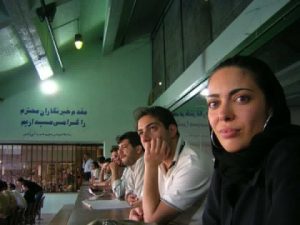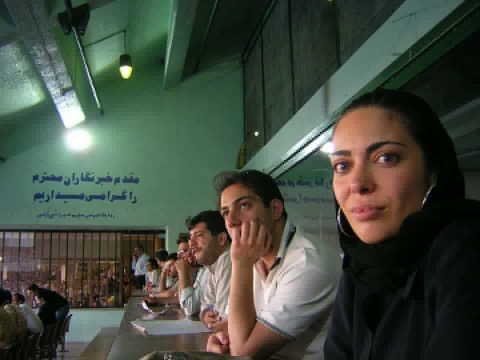
Ramita Navai in Iran in 2005, at a time when women journalists were temporarily allowed in to report on football matches
Up to 20,000 people have now been detained as a result of the protests that have wracked Iran in the past three months. Those who have been detained have been subject to physical and psychological torture, rape and been made to make forced confessions. Some, including 22-year-old Mahsa (Jina) Amini whose death sparked the current protests, have died in custody.
The British-Iranian investigative journalist and documentary maker Ramita Navai knows only too well what those who have been detained are facing. She has been detained by the Iranian authorities several times over the years.
Her first arrest came just after she had started working as Tehran correspondent for The Times and was covering the anniversary of the Islamic Revolution.
“I was at a rally with a lot of other journalists and I was interviewing some Iranians. Before I knew it, two undercover intelligence agents had taken me away; none of my colleagues saw me being taken. It was a terrifying experience. They took me to an abandoned warehouse with broken windows and flexes hanging from the ceiling and there was an armed man standing outside the room. They took all my possessions and carried a table and chairs into the room before starting with a good cop/bad cop routine. It was very manipulative psychologically and was designed to break me. They started telling me that I had been asking anti-revolutionary questions and said I had been telling people how to answer. It was all lies but I was utterly unprepared for this.”
Her interrogators asked her whether she had heard of Zahra Kazemi, a Canadian-Iranian photojournalist who had been killed in police custody shortly before Navai had arrived in Iran.
“Every journalist knew what had happened to her and they were hinting that I would suffer the same fate. I was so petrified I started sobbing.”
Navai was one of the lucky ones. A few hours after being taken, one of her journalist colleagues, Jim Muir of the BBC, noticed she was missing and started talking to the Iraniansat the rally. One whispered to him that they had seen her being taken away.
“He phoned up the Ministry of Islamic Culture and Guidance and said we know you have got her, you had better release her otherwise I am going to cause a fuss about this.”
Navai was released shortly afterwards.
Since then Navai has won numerous awards for her documentary work, including an Emmy for her PBS Frontline documentary Syria Undercover in 2012 and a Royal Television Society Journalism Award for her documentary on tracking down refugee kidnap gangs for Channel 4.
But it is Iran, the country of her birth, where her heart lies.
Her 2014 book City of Lies, which won her the Royal Society of Literature’s Jerwood Award for non-fiction, tells the stories of ordinary Iranians forced to live extraordinary lives: the porn star, the ageing socialite, the assassin and enemy of the state who ends up working for the Republic, the dutiful housewife who files for divorce, and the old-time thug running a gambling den.
Tehran, the City of Lies of the title, is described with romantic nostalgia but rails against the hypocrisy of the regime.
Navai feels there is “no turning back” from the current protests.
“This time feels very different. I think the protests are unlike anything we have ever seen. Significantly, they span all social classes, ethnicities and the protests have happened in every one of Iran’s provinces. The protests have been a unifying force, uniting Iranians of all colours against the regime. I don’t think the regime will fall imminently although I do think something has shifted and there is no going back from that. I think a very different future for Iran has now become a reality in a way that it wasn’t a year ago.”
She adds, “The most organised groups seem to be the Iranian feminist and women’s rights networks because they have been used to mobilising for such a long time. They are used to being arrested and imprisoned. They issue secret missives and are coordinating with some of the activists in prison.”

Navai and her mother Laya at a demonstration in London in support of the Iranian protests
Navai believes it is the moment for Iranian women and those of Generation Z in particular.
“The women’s groups were crushed in 2009 – they were a thorn in the side of the regime. What we are seeing now is a strengthening and a rising up,” she says. “In 2009, it was people my age who were and are very fearful of the regime. The younger generation – Generation Z – are absolutely fearless. My generation always felt like they had something to lose. The regime is brilliant at playing this game of giving people just enough freedom to shut them up. This younger generation have grown up in a very different world, a completely connected Iran in which they have been influenced by global popular culture. They know what is out there in the world. They know all the opportunities that should be open and available to them and they are angry and they are fearless.”
She believes a sexual awakening is also happening in Iran.
“We are talking about this being a women-led uprising, partly this is because this sexual awakening has changed the socio-cultural dynamics for Generation Z. In real terms, virginity is not the thing it used to be. So many couples are living together outside marriage that the Supreme Leader’s office issued an edict saying how immoral it is. These are ordinary Iranians, not just the middle and upper class. There has been this massive socio-cultural shift. Generation Z are used to different social norms and strictures and they are not going to be told what to do. They want full autonomy not only over their bodies but over their lives.”
In the intervening years, Iranian people have become even more resourceful than in previous protests.
“This is what 43 years of a repressive and censorious regime have done,” says Navai. “Most Iranians have VPNs [virtual private networks]. There are occasional blackouts – not all VPNs keep working so they have to change them. Iranian exiles are paying for that service, sending login details to Iranians within the country to help them mobilise. They have also been mobilising in quite interesting ways using social media but actually also old-fashioned meet-ups.”
The recent public expressions of protest by leading Iranians, such as the actress Taraneh Alidoosti and a women’s basketball team, are “hugely significant”, she believes.
“They are emboldening the protesters to rise up against the regime,” she says. “I also think these high-profile protests and the world’s media and social media are a really important tool for this uprising. It is the oxygen that is keeping these protests going. Without the world watching I think the regime would be far more brutal. It has already been very brutal. It hasn’t unleashed its might yet and I am scared that it will.”
In many revolutions, it is when the military switches sides, abandoning their loyalty to the leaders under pressure from the people that real change happens. Indeed, some experts have speculated that change will only come to Iran when that happens. However, there are good reasons to think that may not happen.
Iran’s regular armed forces number around 420,000 plus another 300,000 or so who are reservists who can be called up.
What is perhaps stopping them from switching their loyalty is the Islamic Revolutionary Guard Corps, set up by Ayatollah Khomeini in 1979.
“You have 100,000 to 150,000 soldiers who are the Revolutionary Guard,” says Navai. “It was set up to ensure loyalty to the Supreme Leader and the state and act as a counter-balance to monitor the ordinary forces. These Revolutionary Guardsmen are better trained, far better equipped and are far more loyal – they are ideologically motivated and answer directly to the Supreme Leader. It will be a big turning point if the army turns, however I think that could also result in a bloodbath.”
There are also the Iranian regime’s allies beyond the country’s borders – the Shia militia in Iraq and Hezbollah.
What is clear from Navai’s City of Lies is the widespread hypocrisy of the Iranian regime. It tells stories of clerics using prostitutes and the ubiquity of porn.
“This is one of many reasons that Iranians have had enough,” says Navai. “The regime is not only corrupt politically, it is corrupt morally. While the state enforces laws that govern its citizens’ most intimate affairs meanwhile people in power do as they please. You have people in power whose children are partying in Iran and across the world, doing drugs, wearing whatever they want and having normal sexual relations that are not allowed under the regime. It is this hypocrisy that people are finally fed up with.”





